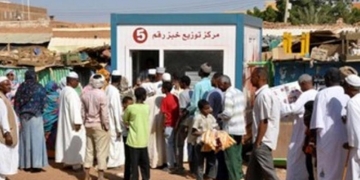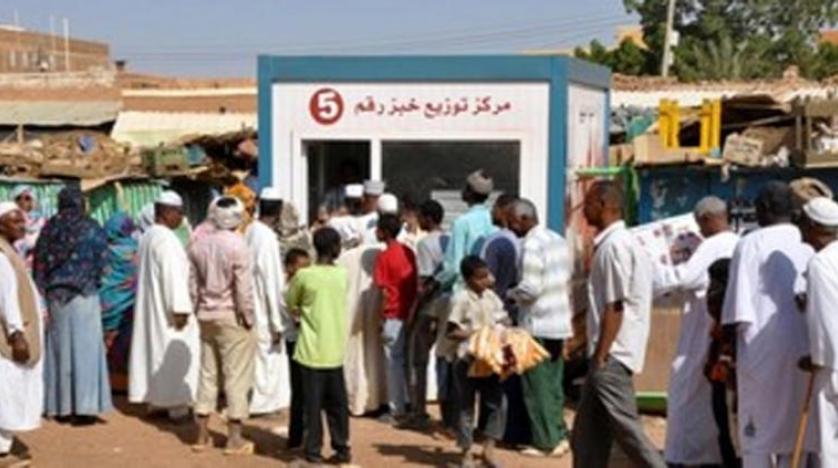Khartoum: Shaza Al-Rahma
Despite the official and popular efforts to manage the Corona crisis in Sudan, the living situation stands in the face of all the precautionary procedures taken to confront the pandemic, so looking at the miserable queues lining –up in front of all service outlets “bakeries, gas stores, fuel pumps stations”, in addition to an acute crisis in cooking gas , these queues forcibly broke the instructions of the state to impose complete lockdown to prevent the spread of the Corona pandemic, as the cries (call of the bellies) are more dominating and effective than the (fear) of the disease. Accusations has been widely directed to the state and its specialized institutions not to attain efforts to arrange for sufficient provision of the necessary needs before the lockdown.
These shortages led the citizens to forcibly break the lockdown. (Afroshongir) investigatively paused with economists and consumer protection officials to come up with urgent solutions under the current circumstances, especially with the arrival of the month of Ramadan which needs a greater arrangement to meet the increase in the consumption of necessary commodities.
For his part, Kamal Karrar, a member of the Economic Committee for Freedom and Change Forces, said in his testimonies that this period needs to be addressed on a health and economic levels, in addition to adhering to the health precautions that exist in all parts of the world, including the comprehensive lockdown. The pandemic is a killer and there is no solution other than a comprehensive lockdown. Karrar believes that at it is targeted by the government to provide the necessary food commodities to citizens in different neighborhoods, workers (in day- to-day livelihood vocations) and different sectors. He added, “But these crises are not solved by one blow and need time to solve”. He stressed on the formation of an economic mechanism to successfully over go these various crises, pointing out that the resistance committees started to distribute food commodities with the change and services committees directly from the processor to the consumer without going through intermediaries.
Karrar confirms that there is a hectic work to meet the needs in each neighborhood, and he expected an abundance of flour and gas within a week to end the phenomenon of rows which he considered a fundamental threat to the health of citizens and described the current rows and crises as a disgrace to the revolution.
He stressed that there should be an economic planning different from what is going on now in order to reduce the sufferings of the citizen. He held the state responsible for the imported goods that are provided from abroad, calling for the conclusion of agreements with specific bodies or countries to provide and cover these needs. The defunct regime was accused of placing the necessary commodities and imports under the parasite sector of the capitalists who are only interested in their interests and demanded that this equation should be changed by entering the state in the export and import to provide the necessary commodities at reasonable and cheaper prices.
Opacity
With the current crisis attributed to bread , gas and flour, which he described in depth, to mismanagement, poor planning and lack of transparency, indicating that in the event of low stocks, quotas must be provided to deliver them to consumers to achieve justice and in order to overcome the black market in these commodities and illegal storage and also to limit under the table trade. He also charged and accused what he called the “deep and corrupt state” present in the various circles of distribution by creating a network to over go this . He called for opening the door to a kind of different economic dealings through cooperatives and resistance committees in neighborhoods to ensure that these goods reach the real consumer and not to the broker with the presence strict control over the pricing which should not exceed the set price. He also called for sound punishments that deter anyone who tries to trade illegally in people’s food stocks.
Unbearable legacy
The Ministry of Industry and Trade formed a committee to manage consumer goods after the great chaos in the Sudanese market and commodity prices which were described by Dr. Omar Ibrahim Kabbashi, a member of the committee and vice-president of the National Consumer Protection Agency, which was formed by the new transitional government to reduce price chaos or the “weighted legacy” left by the defunct regime, stressing that there is a wretched campaign against the new Minister of Industry and Trade, but he inherited the Ministry almost in (ruins). The Ministry had been striped from (11) bodies belonging to it as all the powers of the Ministry of Commerce known worldwide including managing (sugar stocks, strategic stocks, specifications and standards, free markets, all import, export and credits) and so the ministry has been plucked from its authorities, indicating that all these bodies were lobed according to the issuance of a separate law concerning each of these bodies.
Upcoming amendments to the laws
To retrieve these bodies affiliated with the Ministry, the need arose to amend (8) laws, including the Law (Trade and Register of Exporters and Suppliers, the Council for the Promotion of Competition and the Prevention of Monopoly, and Dumping, Supervision) to align it with the existing laws. He continued: The country was (owned) by the security that dominated all files of Commodities such as flour, sugar, gas and fuels for economic security. He added: To rearrange these matters they must be the subject of great efforts. He attributed all the problems that happen now to the policy of economic liberalization which was initiated by the economist and then Minister of Finance Dr. Abdul Raheem Hamdi, who worked to repeal the Goods Control Act of 1978 which allows, by orders of the Ministry of Commerce, to set the indicative commodity price at a profit rate not exceeding (20%). The Ministry of Trade was then (a frightening bogey) for traders due to the strict and disciplined control in the presence of its offices inside Markets and certain prosecution of any trader violated the set prices. Retrieving the previous situation depends on creating and adapting the legal environment to restrict complete price liberalization. The association has fought many battles that resulted in the passage of the national law for consumer protection after great obstacles.
Commodity Marketing Committees Law ; The following Out way
Kabbashi said that after examining the old laws of the defunct government, an important law (Commodities Marketing Committees Law 1968) fell from consideration inadvertently. This law gives the governor of the state the right to price any commodity between two limits; a minimum and a higher limit, indicating that the country’s executive system lacks competencies and that all its levels have been exposed (to destruction);the localities and administrative units and besides the deep rooted corruption in the system.
Consumer Protection Law
Kabbashy notes that Article (6C) of the National Consumer Protection Law gives the National Consumer Agency the right to limit the rise of goods’ prices in the market in cooperation and coordination with the competent authorities in the Ministry of Trade and announced the setting of prices of about (9) commodities. He also revealed an arrangement according to the law for commodities , the necessary consumables that accommodate the basket of low-income people, through which a daily price will be issued by the Ministry of Commerce, just like foreign exchange (the dollar) includes sugar, flour, lentils, dairy, rice, oils and cement as basic commodities, and then will delegate power to the states’ governors to set prices in their states .
Al-Kabbashy revealed that the next stage will be the responsibility of the consumer, that any owner of a commodity or dealer selling to the consumer a commodity at more than the stipulated price, the consumer must submit a complaint in this regard to the Consumer Protection Prosecution in addition to the Police and Supply Investigations and the Sudanese Society for Consumer Protection, explaining that the committee now has completed formulation of the law and is in the process of submitting the copy to the Minister of Industry and Trade to announce his decisions in cooperation with the governors, pointed out that the policy of economic liberalization was a fatal blow to the middle sector and the poor that crushed the middle and poor classes and there is a need for a long time duration to return citizens to a satisfying living standard. He concluded that ruin was in a great magnitude in the entities that implement the decisions of the minister or the governor. The civil service was also destroyed with the brain drain, hence the state should uproot the system, not only the personnel. We know suffering has become double, there are queues, there are measures to prevent a pandemic (coronas) and there are also greed and moral degradation.















